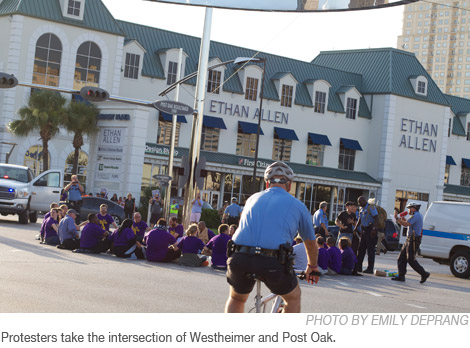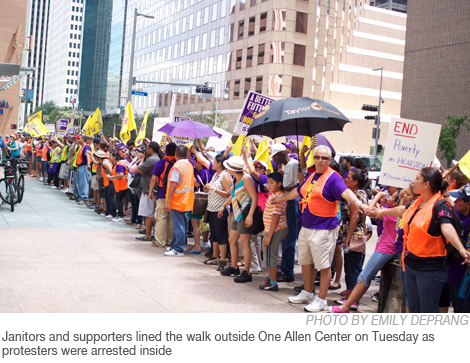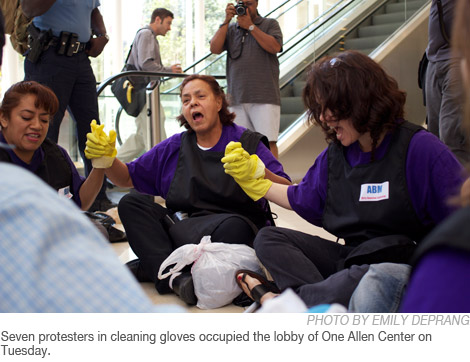Houston Janitors Make Bold Moves on the Eve of Negotiations
I’ll admit it: I was scared. The crowd of about 500 had split up, lining the sidewalk on both sides of arboreal Post Oak Boulevard in tony West Houston, in front of the Neiman Marcus. They were waiting. Dozens of cops on horseback and bike and foot and in cars were also waiting. A press release from the Houston janitors’ union, Service Employees International Union Local 1, had announced another wave of civil disobedience, and already that morning several janitors and supporters had been arrested at a smaller protest downtown.
An organizer explained the plan. “They’re already waiting at the Jamba Juice. We have cars involved as well.” Two dozen janitors and supporters would wait until the marching crowds approached, then run into the street and sit down, blocking the intersection of Westheimer and Post Oak.

I had seen similar protests go wrong in my days as an agitator past; people get hurt, cars and police get angry. It was seven—Houston’s rush hour just beginning to ebb—and hot, the temperature 96 degrees and the heat index far more. The janitors wore purple and carried yellow flags and chanted in English and Spanish. Many blew shrill whistles. Faces were sober. These were not college kids. The crowd was largely middle-aged and Hispanic with lined faces, more women than men, some with children in tow. They were people with something to lose.
It was Wednesday, the eve of the janitors’ return to bargaining with the cleaning companies that contract them out to some of the most high-powered offices in the city. The janitors’ contract expired at the end of May, and since then they’ve rallied every day. Workers like Hernan Trujillo, whom we profiled here, were threatened by managers for participating in the rallies, so on July 11 the union announced a citywide strike against unfair labor practices. The following week, janitors in Los Angeles, Chicago, and several other U.S. cities joined the strike in solidarity. Vice President Joe Biden met with strike leaders when he was in Houston for the NAACP convention. Representative Sheila Jackson Lee and Houston’s Catholic Archbishop Emeritus Msgr. Joseph Florenza have spoken out on the janitors’ behalf. And on July 20, Mayor Annise Parker called for the cleaning contractors to return to the bargaining table, saying, “Their unwillingness to talk has left the union with no other choice but civil disobedience. That is not good for the City of Houston or our economy and it is not how we do business in Houston. We work hard, we work together and we treat each other fairly.”
Houston janitors currently make $8.35 an hour, one of the lowest janitor wages in the country, in one of the nation’s most robust economies. Contractors have also saved money by cutting the janitors’ hours to five or six a night while still expecting them to do the work other cities’ janitors do in eight, further depressing wages. The SEIU says the average Houston janitor makes about $9,000 a year, less than the poverty level for one person. The janitors want a $1.65 raise over three years, bringing them to $10 an hour. The seven contractors, all of whom have consistently declined comment, offered a 50-cent raise over five years, which the union calls “insulting.”

On Tuesday, hundreds gathered around seven protesters who scattered paper in a downtown lobby mid-day, then cleaned it up and sat down in a circle and were arrested. The protests, the arrests, the rallies are all to draw attention to the strike and make the contractors, and the businesses who employ them, uncomfortable enough to give ground in negotiations. By the end of the week, they’ll know if it worked.
Late Wednesday, the hour had come. Marchers massed in all four corners of Westheimer and Post Oak, and suddenly the chosen protesters were there, running into the street, tearing off their over-shirts to reveal the purple strike shirts underneath. They circled, sat cross-legged, scooted in close and waited.
Cars honked. Cops ran and rode to surround them. But the disaster I feared never came. Police moved without haste or anger. Some redirected traffic, some applied riot cuffs and read rights. A van backed up to receive the arrested. The striking janitors bore witness, as they’d come to do. Range Rovers were inconvenienced. Some of the lowest-paid, most invisible workers in the city took a stand in front of the Ethan Allen. And everybody was okay.

When police loaded the last of the sitters into the van and drove away, away, organizers directed the strikers down Post Oak to the grassy lawn and fountain beside the Galleria, that swankiest mall in Texas. Cops rode lazily now along with them. People laughed and talked. If this were 20 years ago, cops and protesters alike would have lit up cigarettes.
A car pulled up and unloaded stack after stack of pizzas for the strikers. The sun had dropped behind the skyline and the air was purple and starting to cool. Kids ran across the lawn with yellow flags and one had a kite. Everybody had done what they came to do. And if need be, they’ll do it again.


